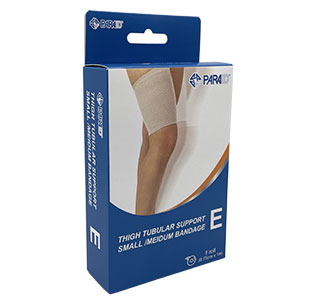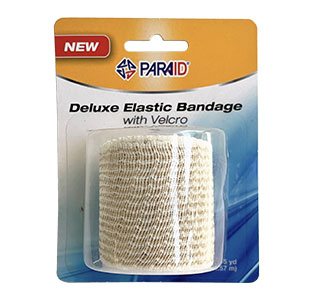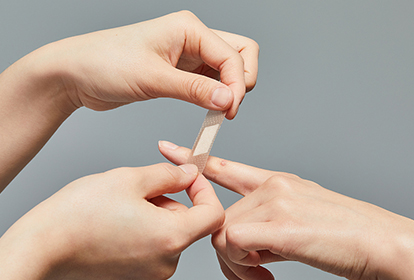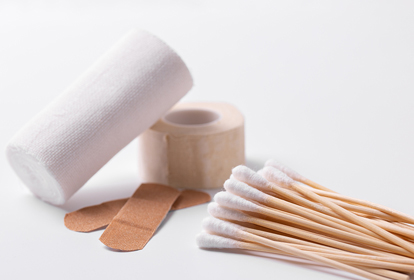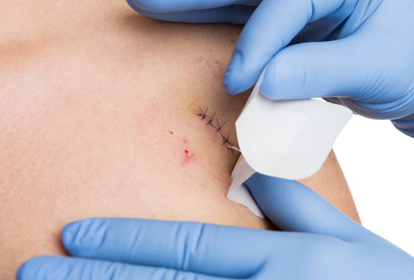Discovering that you're on the itchy end of a bandage allergy is as surprising as it is uncomfortable. I’ve delved into the world of bandage allergy solutions, combing through adhesive bandage alternatives, and compiling savvy strategies for managing skin allergies. Whether you're dressing a minor cut or supporting a healing wound, it's crucial to have sensitive skin care in your corner. Let me share my findings and guide you through skin-friendly healing methods that promote recovery without the irritation. For those with sensitive skin, companies like Planet Medi offer a range of hypoallergenic bandages that you can rely on, including bulk plastic adhesive bandage strips and bulk adhesive bandages, ensuring your skin integrity while nurturing its natural healing process.
Understanding Your Allergy to Adhesive Bandages
Identifying that unpleasant rash or irritation after using an adhesive bandage can be a turning point for many looking to ease discomfort. Becoming knowledgeable about allergic symptoms and skin irritation caused by bandages is the first step in taking control of your sensitive skin's needs. you may need bulk adhesive bandages.
Identifying Allergic Reactions
Are you experiencing redness, itching, or blistering where the bandage was placed? Your body may be responding to allergens in the bandage's adhesive. This reaction, commonly known as contact dermatitis, can be incredibly uncomfortable and a sign that your skin disagrees with something in the adhesive material.
Common Allergens in Bandages
Let's get to know the usual suspects of adhesive allergies. Elements like latex, acrylate, and various rubber accelerators are often integrated into bandage adhesives to enhance elasticity and stickiness. However, they can also induce allergies in some individuals.
Types of Adhesive Bandage Allergies
The most prevalent type of allergy from bandage adhesives is allergic contact dermatitis, where symptoms gradually develop over several hours or days. However, immediate allergic reactions are a possibility, although they are less common. These reactions are more severe, and symptoms can include swelling, redness, and blistering that arise minutes after application.
| Allergy Type | Symptoms | Onset |
|---|
| Allergic Contact Dermatitis | Redness, itching, blisters | Hours to days |
| Immediate Allergic Reaction | Swelling, redness, hives | Minutes to hours |
In any case, understanding the nuances of your adhesive allergy identification plays a crucial role in how you will manage and treat your skin moving forward. Stay tuned for ways to address these reactions and mitigate discomfort in the upcoming sections.
What to Do if You’re Allergic to Adhesive Bandages
Discovering an allergy to bandage adhesive can be a startling setback when you're trying to heal a minor wound. If you notice signs of skin irritation after using a bandage, the first step is to immediately remove the bandage. Once the bandage is off, it's crucial to clean the area gently to remove any adhesive residue that might aggravate the skin further. In some cases, applying an over-the-counter steroid cream can soothe the itching and redness.
Finding a long-term solution to this issue often involves identifying the specific allergen that's causing the reaction. From there, you can explore skin-friendly bandage alternatives designed for sensitive skin. For example, bandages available through Planet Medi, including clear adhesive tape for skin and wholesale medical tape, are crafted to cater to those with adhesive sensitivities, ensuring your skin can recover without additional irritation.
Dealing with persistent or severe skin irritation treatment can be challenging, and it's occasionally more than just a minor inconvenience. If home remedies and over-the-counter options don't alleviate your symptoms, I recommend consulting with a dermatologist. These specialists can offer tailored advice and, if necessary, prescribe treatments that provide relief and cater to your first aid for sensitive skin needs.
Remove the bandage carefully to avoid further skin damage.
Gently cleanse the affected area, removing any residual adhesive.
Consider applying a mild steroid cream if the area is particularly inflamed.
Seek out hypoallergenic bandage options like those from Planet Medi.
If symptoms persist, speak with a dermatologist who can guide you towards a personalized treatment plan.
Alternatives to Traditional Adhesive Bandages
For many of us dealing with sensitive skin, finding the right kind of wound care is crucial. It's about comfort, safety, and healing efficiently without triggering a negative reaction. Below are some effective alternatives to traditional adhesive bandages that cater to those special concerns.
Hypoallergenic Bandage Options
If you're on the lookout for hypoallergenic bandages that put your skin first, consider products from brands like Planet Medi. They focus on creating non-irritating bandage options that are less likely to cause allergic reactions. Planet Medi's range of hypoallergenic bandages have been engineered to care for your skin while protecting your wounds just as effectively as traditional bandages.
Fabric Bandages and Their Benefits
Fabric bandages offer a unique advantage in wound care. The softer fabric feels more comfortable against the skin, making them a preferred option for individuals with sensitivity issues. They conform more easily to the body's contour, ensuring a snug, gentle fit. Additionally, many fabric bandages are designed to be breathable, which is a crucial aspect of the healing process for sensitive skin.
Using Gauze and Paper Tape: A Safe Choice
When hypoallergenic and fabric bandages aren't on hand or if you're looking for the most neutral wound care solution, gauze and paper tape are your best bet. This combination is often recommended for its minimal skin irritation risk, making it a go-to for healthcare professionals and those with allergy concerns alike. The paper tape is gentle on the skin while the gauze pad provides the necessary absorbency without the use of adhesives that can trigger allergies or reactions.
Considering sensitive skin bandage alternatives is not just about managing an existing allergy, it's also about preventing one. With options like hypoallergenic bandages and non-irritating fabric choices, there's no need to compromise on your comfort or health. So next time you're faced with a minor cut or scrape, remember these skin-friendly solutions that are tailored for your wellbeing.
Preventative Measures to Avoid Allergic Reactions
Taking control of my sensitive skin means I've become vigilant about allergy prevention. Through experience, I've found that a few strategic practices can make a significant difference in avoiding the discomfort and irritation that comes with allergic reactions, especially when it comes to adhesives in bandages.
Patch Testing for Allergies
Before committing to any new adhesive bandage, I always conduct a patch test. This simple procedure involves applying a small piece of the adhesive material on my skin and waiting to see if there's an adverse reaction. By doing this, I've successfully identified products that could have caused me skin woes and steered clear of them. Incidentally, testing products from Planet Medi has allowed me to find bandages that are kind to my skin without sacrificing quality or protection.
Best Practices for Sensitive Skin
As part of my allergy prevention toolkit, I've built a sensitive skin care routine that is replete with hypoallergenic products. My daily regimen now includes skincare items designed to fortify my skin's barrier, reducing the likelihood of irritation. From facial moisturizers to body lotions, selecting gentle formulas without harsh chemicals or fragrances plays an integral role in keeping my sensitive skin calm.
Tips for Skin Care Before Bandage Application
Lastly, pre-bandage skin preparation is key to minimizing potential allergic reactions. Here's a table highlighting the steps in my routine that ensures my skin is clean and protected before applying any bandage:
| Step | Action | Reason |
|---|
| 1 | Cleanse | Removes dirt and oils to prevent infection |
| 2 | Dry | Ensures adhesive sticks properly and reduces moisture that can lead to irritation |
| 3 | Apply Protective Layer | Optional: Uses a thin barrier cream or lotion to provide a protective layer between skin and adhesive |
| 4 | Apply Bandage | Secures safely on skin ready for healing to commence |
| 5 | Monitor | Check regularly for signs of reaction to change the bandage if necessary |
By sticking to these steps, I give my skin the best shot at steering clear of irritation. It's simple, effective, and has made the necessity of wearing bandages a lot less daunting for my sensitive skin.
How to Treat Allergic Reactions to Bandage Adhesive
When I discovered I was dealing with a bandage allergy, it became crucial to learn the best practices for treating bandage allergies. I found out that the initial step involved the use of over-the-counter hydrocortisone creams, which can significantly alleviate skin inflammation and itching. Additionally, taking antihistamines helped me manage the systemic allergic symptoms. Importantly, aftercare for adhesive reactions is not just about treating the symptoms — prevention of further irritation is vital.
I've also embraced a variety of skin allergy remedies that can be easily prepared at home. For example, aloe vera gel has worked wonders due to its cooling and soothing properties. A cool compress applied to the affected area also provides immediate relief from itchy skin. Here's a helpful table that summarizes the remedies I use for mild allergic reactions:
| Treatment | Description | Frequency | Effectiveness |
|---|
| Hydrocortisone Cream | OTC cream to reduce swelling and redness | Up to 4 times a day | High |
| Antihistamines | Medication to control allergic symptoms | As directed on the package | Varies |
| Aloe Vera Gel | Natural remedy with cooling effect | As needed | Moderate to High |
| Cool Compress (instant ice packs bulk ) | Gentle pressure using a cool, damp cloth | 10-15 minutes per application | Moderate |
Maintaining the hygiene of the irritated skin by keeping it clean, and most importantly, avoiding further use of the irritating adhesive, are steps that cannot be overemphasized. Lucky for me, I discovered hypoallergenic bandages from Planet Medi that have enabled me to cover my wounds without worrying about another allergic reaction. So, if traditional bandages are off the table, consider switching to these skin-friendly alternatives to protect your skin while it heals.
When to See a Doctor for Your Allergy
As someone who has navigated the tricky waters of skin allergies, I've learned that there are times when seeking medical advice is more than just a precaution—it's a necessity. Despite our best efforts to manage allergies to adhesive bandages with at-home treatments and over-the-counter solutions, there are moments when only a professional allergy treatment can give us the relief we need. If your skin reacts with severe allergic symptoms that include extreme redness, persistent itching, swelling, or, more alarmingly, breathing difficulties, it's time to consult an allergy specialist.
Signs That Your Allergy is Severe
It's crucial to recognize when an allergy crosses the line from annoying to dangerous. I've learned to watch for warning signs such as hives, blistering, or an area of inflammation that grows rather than shrinks over time. These symptoms shouldn't be ignored, nor should systemic reactions like respiratory issues, which can indicate a more serious condition. When these signs appear, delay can exacerbate the issue, making prompt medical attention essential.
What to Expect from Allergy Testing
When I took my concerns to an allergist, the experience was enlightening. The medical professional used various diagnostic tools, including patch tests, to determine exactly which substances were triggering my reactions. This process can be the first step towards personalized and effective treatment options, giving those who suffer a clear path to minimizing or avoiding further allergic flare-ups.
Treatment Options for Severe Allergic Reactions
In cases where allergies are severe or persistent, an allergy specialist may prescribe more robust treatments. This could include prescription medications that are more potent than their over-the-counter counterparts, or even immunotherapy—a more comprehensive approach to desensitize the body's response to specific allergens. For me, exploring these options was a game-changer in the quest to live comfortably with my allergies.
Recommending Reading:
Who primarily benefits from first aid training
How to put bandage on knuckle
How to remove surgical tape from skin without pain
What are the 5 rules of wound dressing
 English
English
